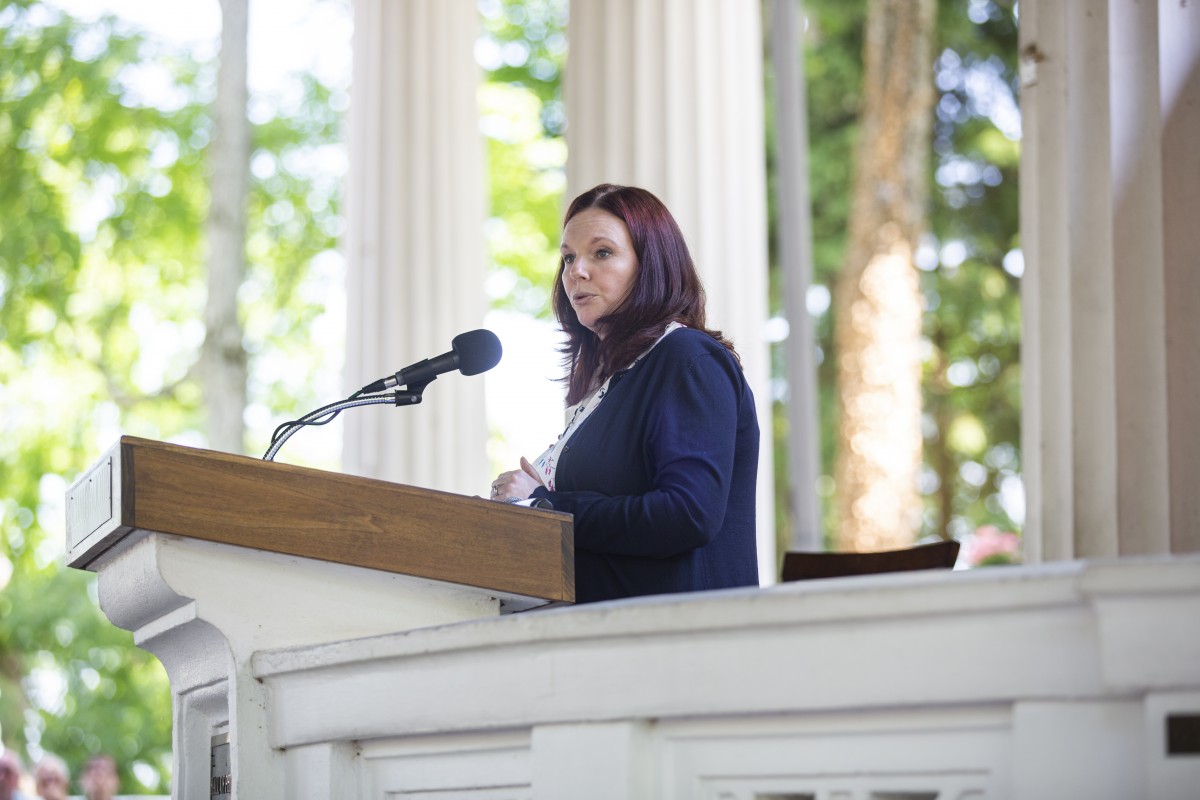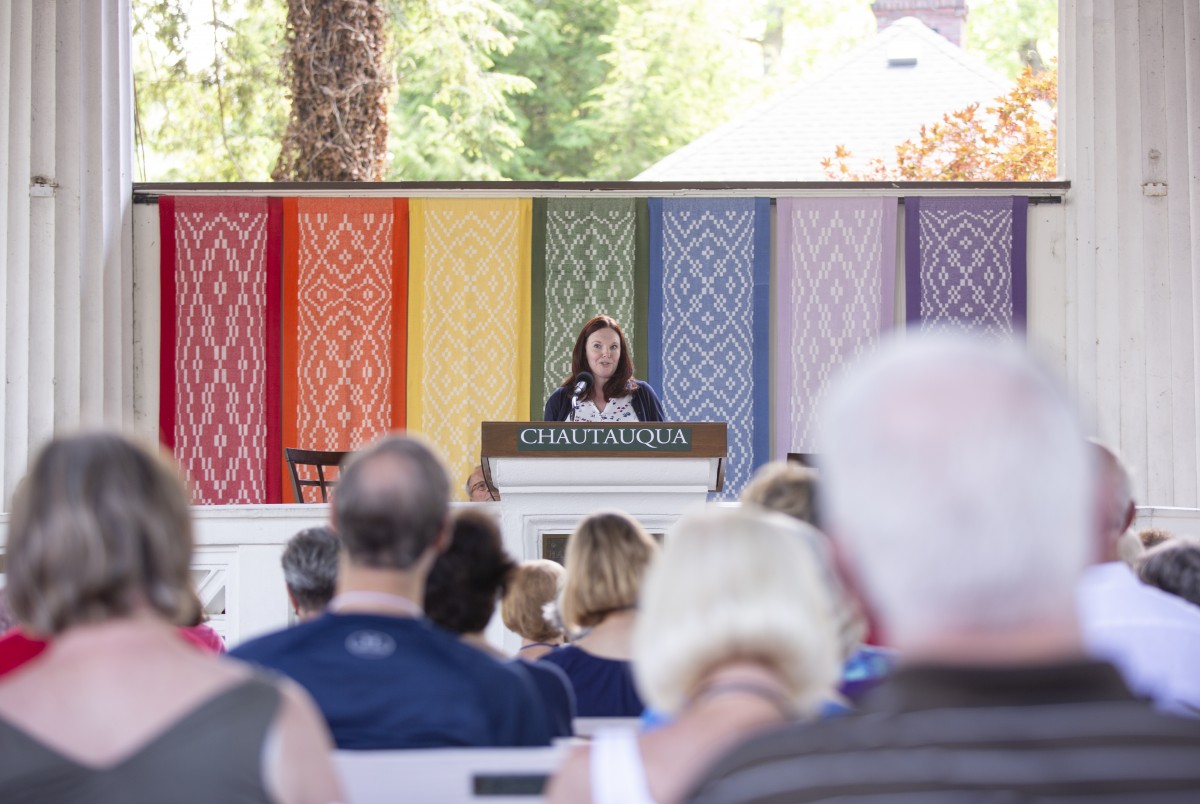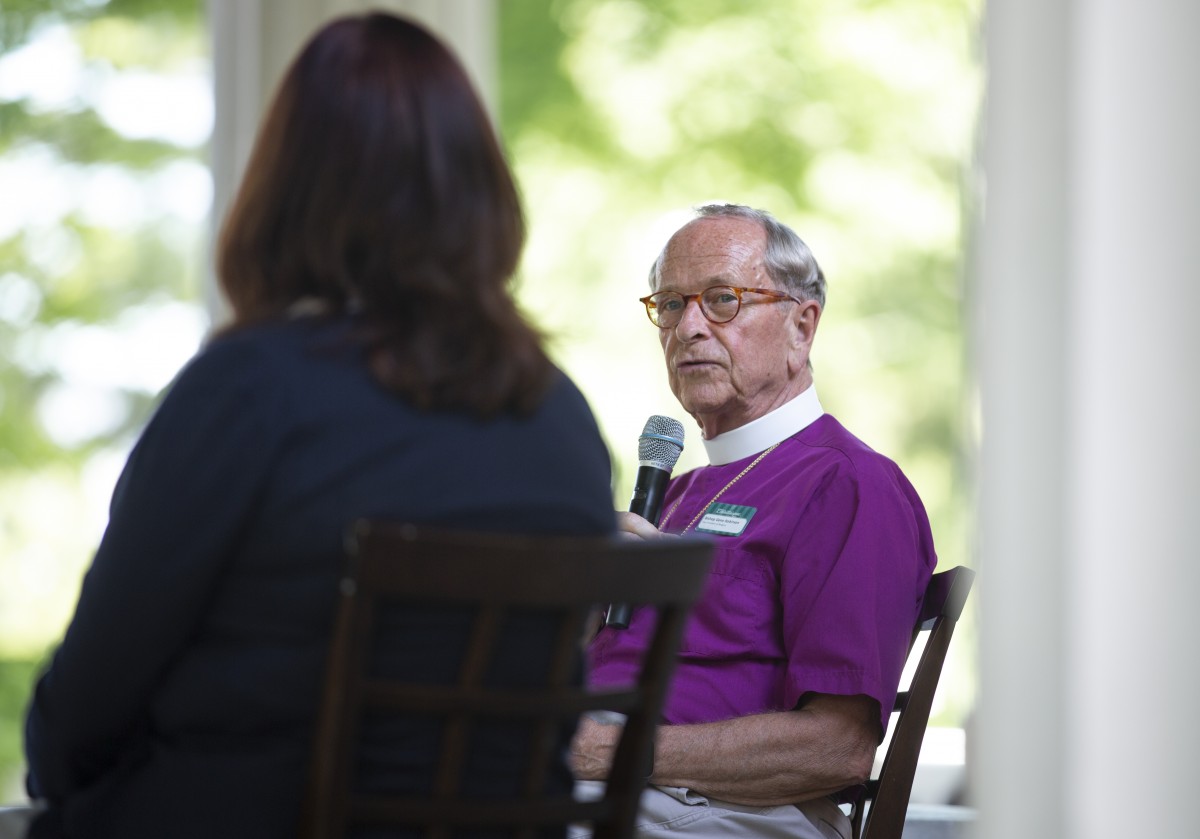To start off the Interfaith Friday Series in the Hall of Philosophy, the Rt. Rev. V. Gene Robinson, vice president of religion and senior pastor, posed a series of questions to Amy Brown Hughes, who spoke on behalf of Evangelicalism.
Hughes is an assistant professor of theology at Gordon College. She earned her bachelor’s degree in theology and historical studies from Oral Roberts University in 2001; her master’s degree in historical theology from Wheaton College; and her Ph.D. in historical theology with a focus on early Christianity from Wheaton College.
She is the co-author of Christian Women in the Patrisitic World: Their Influence, Authority and Legacy in the Second through Fifth Centuries, regularly presents papers at the annual meeting of the North American Patristics Society and is a co-host for the theology stream of the biblical studies and theology podcast, “OnScript.”
What follows is an abridged version of Hughes’ conversation. Hughes and Robinson’s remarks have been condensed for clarity.
Robinson: Will God intervene if we ask? Or, should we be asking for something different?
Hughes: God does engage with us and wants to interact with us. A Jewish friend once told me that if you’re not arguing with God, you’re not doing it right. That same friend told me she didn’t like Noah because he never said anything back to God after killing all those people. And, I think God is inviting us to engage and wants to intervene, and we choose into it. The key is that we have to see it, to recognize it. Once we recognize it, that then becomes an opportunity to work with God.
What are we asking for when we say, “God bless America”?
It depends on who you talk to. I do think that there is an assumption that God is on our side based upon the narrative we have about our country, and that can be really problematic. But there is also the idea that people make up America and we want God to engage with us. We want God to help us flourish as a people who live in this particular land at this particular time. If that is what we are praying for when we say, “God bless America,” that makes a little more sense. However, with the assumption underneath that’s saying bless us over other people, that’s a problem.
How do you understand prayer?
With prayer, there’s an assumption underneath prayer. First, we have to ask ourselves this question about determinism: What kind of universe do I think I live in? If we live in a universe where we think God has planned everything and we are just along for the ride, then why pray at all? But in Scripture, people pray over and over again, expecting God to do something, expecting something to happen. So, there is also that kind of universe. Ultimately, God is perfectly free. He doesn’t have to do what we pray. God can choose not to do that, and I am so grateful that God didn’t answer my prayers in college because, if he had, I would be married to somebody else, and it would not have been good. We pray things all of the time that aren’t good for us, but we’re learning. It’s conversation. We don’t know, and we have to grow and grow into maturity. God is gracious to us: “Well, let’s talk about why you want that.” That’s the kind of grace we should extend to others, so when we are praying for others, we do have to be mindful of their agency. God does act, but he is not going to intervene in someone else’s life in a way that is going to destroy them because you asked him to.
What is an ask that would honor who God is and what God is willing or not willing to do when praying?
I would pray for people to come to know who they are and pray for their own flourishing because I do not know their personal path, so I want to ask for God to be near them, for God to be with them — that’s a beautiful prayer. If you know nothing else to pray, pray that God will be with someone because presence isn’t coercion. It can be transformative. Think about when you’ve gone through something awful and your friend came and sat next to you and didn’t say anything. It doesn’t solve any problems, but it sure helped in that moment. The Scripture talks about how, when we don’t know what to pray, we ask for help because the Holy Spirit is always with us, always ready to help us.
Many ordained people would describe part of their life as feeling a call from God, which is why ordained ministry can be known as a “calling.” Would that be considered God meddling in their business?
No, I think that we are all individually on a journey of coming to know who we are, and I think God is working with us to help us try to understand who we are. Origen talks about this fundamental dictum that has been around forever: scito te ipsum. This means, “Know thyself.” And, you kind of have to start any theological process with “know thyself.” So, when the Psalmist talks about “search me and know me,” that’s an invitation to God to work with us to help us to know who we are, and I think that’s what calling is. Calling is the middle or end of a conversation where you have sort of been in the process of the “search me and know me,” and you’ve sort of come to some understanding of who you are.
So, let’s say that you say to someone who has Hodgkin’s (lymphoma), thinking that it will somehow bring them comfort, “God is trying to teach you something.” So, with that being said, what are some of the bad theologies around us?
Oh God, how many hours do we have? What doesn’t kill you makes you stronger. God’s got a plan. God must be teaching you something through this. There are just tons of them. I mentioned earlier, the idea of “God must have planned this,” for a person to say that and think it’s comforting, it’s because the idea of something being out of God’s control scares them. Pentecostalism, for example, does a “God will heal you” kind of thing. “If you just believe, God will heal you,” and I have watched that literally destroy people’s lives. These people who believe in these preachers look so desperately for something, and these “ministers” sort of poke at this place of deep grief and pain, monopolize it, monetize it and sensationalize it. That sort of reputation of some ends of Pentecostalism is to our great shame, and we need to repent for that and change. Also, the idea of “it’s your fault” is problematic. I remember when there was all kinds of conversation around New Orleans, Hurricane Katrina, that it was because they were so supportive of the LGBTQ community they got a hurricane. Oh my gosh, no. Either assuming that authority individually in one’s life or assigning an assumption of what God’s judgement looks like in that way, are two really disruptive ends of theology.
If God isn’t going to control all of that, and it seems to me that all of the bad things we say are in an effort to not take responsibility for them ourselves, what is he in control of?
I tend to not use the phrase, “God is in control,” because that does tend to undercut the other things we know about God being noncoercive and a God who holds all things together on our behalf so that we can choose. So, if there is a sense of God’s power, God’s power is allowing us to have our own power, and he has created a space for us to choose, to live and continue to grow or continue to say no to that.







